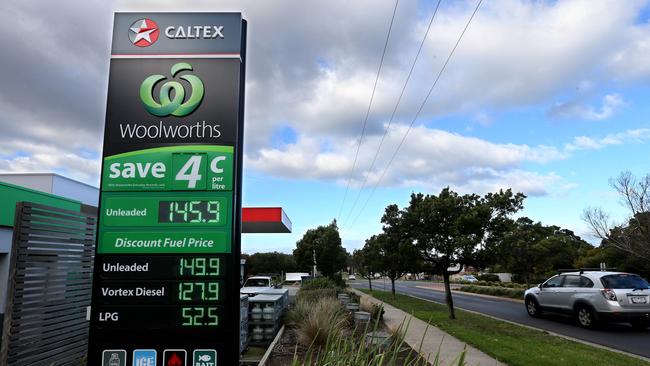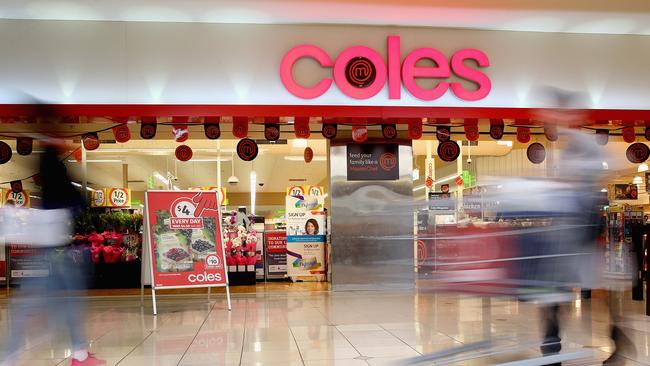Supermarket monsters: How Coles and Woolworths suffocate us
SHOPPERS are flocking to Aldi as a ‘protest vote’ against the Coles and Woolies duopoly - but Aldi might be ‘even worse’.
SHOPPERS are flocking to Aldi as a “protest vote”, but the discount chain is even worse than the Coles and Woolies duopoly, according to a new book.
Each week, every man, woman and child in Australia spends $100 each at Coles or Woolworths outlets. Whether you’re buying groceries, petrol, hardware, booze or pushing money into the pokies, the mega-retailers have come to dominate our way of life.
Australia has the most concentrated supermarket industry of any country in the world. The duopoly threatens the entire retail industry, and their unprecedented power allows them to intimidate farmers, suppliers and employees.
While prices at the check-out might fall in the short term, the cost is shifted: farms become consolidated, choice grows limited and quality falls away.
That’s the bleak picture painted by author Malcolm Knox in his new book, Supermarket Monsters: The Price of Coles and Woolworths’ Dominance, which lifts the lid on the dirty tricks used by the big two in their rise to power.
These range from requiring suppliers to pay “voluntary” marketing kick-ins, to forcing shopping centre operators into “ruinous” terms unless they lock out smaller competitors, through to taking legal action against dead employees.
Statistically, he writes, Coles and Woolworths are almost mirror images. Each company has nearly 1000 supermarkets, nearly 700 petrol stations, more than 1000 bottle shops and hotels — making them the country’s biggest pokie operators — and more than 500 variety and hardware stores.
“It’s impossible not to be affected by them. To live in Australia today, you have to try very hard not to come into the orbit of Coles or Woolworths on a daily basis,” Knox said.
“As a journalist, it seems that this was something that hadn’t really been examined in a holistic or cohesive way. Bits and pieces would come out, but it seemed necessary to bring those pieces together.”
So what should consumers do? Unfortunately, there aren’t a lot of good alternatives. Knox says the growing cynicism towards the duopoly has led to a “protest vote”.
“There has been a major shift in public feeling against Woolworths and Coles, but it lacks coherence. A lot of that is represented in the drift to Aldi, but if you care about suppliers and manufacturers you wouldn’t be choosing Aldi over Coles and Woolies,” he said.
“Aldi do many of the same things to a more effective extreme. It’s like the protest vote in an election, but you don’t realise you’re only aggravating the situation.”
In the book, Knox expands and updates his eye-opening 2014 essay in The Monthly, which told the story of Marco and Nick Nikitaras, owners of the Hill Street Grocer in New Town, Hobart.
The duo run a family grocer the way it used to be, but are “losing behind the scenes, in the farms and the fields”, as the supermarkets’ exclusive contracts cut down their supply options.
“That particular story seemed to crystallise a lot of the issues: the difficulty of individual operators to compete, the shortcomings from a consumer point of view, lack of brands, poor service,” he said.
“The response is always that it’s a free retail market, that any competitor can come in and meet demands that aren’t met. The Nikitaras brothers were the exception that proved the rule, showing just how hard it is. The things they’re doing in Hobart, difficult as they are, wouldn’t be possible in other parts of Australia.”



One chapter of the book deals with the human impact of how Coles and Woolworths use their massive legal power. Whether it’s pay deals with unions or compensation for former employees or customers, the duopoly fight tooth and nail through the courts against all comers.
“The supermarkets have spent millions in the courts fighting even their longest-term workers, some of whom had no history of difficulties with their employers,” he writes.
In one example, Woolworths attempted to show an employee was faking an elbow injury by hiring private investigators to follow him and film 77 hours worth of footage, just two of which were produced in court.
Ian Douglas Warfe, an employee of 17 years, eventually won his compensation case. Woolworths spent far more contesting the case than they ultimately had to pay out, Knox notes.
“In exercising its legal rights, Woolworths has seldom followed a policy of keeping prices ‘cheap cheap’,” he writes.
Knox says there is a “code of silence” among suppliers, many of whom sell only to Coles or Woolworths. “What I would like to see is mechanisms for suppliers to be able to bring illegal behaviour to regulators’ attention,” he said.
Mr Knox said the Australian Competition and Consumer Commission had its work cut out for it in addressing the problems.
“The first problem the ACCC faces is the code of silence where people are bound to secrecy by their own self-interest. Everybody knows they can’t afford to complain,” he said.
He said ideally, the supermarkets would be required by law to sign up to the Australian Food and Grocery Council code of practice — Woolworths and Aldi have signed up, Coles is yet to, and Metcash has said no.
In the past, they could simply exempt themselves from certain provisions whenever it suits them, although changes brought in by Small Business Minister Bruce Billson have tightened up ‘contracting out’ loopholes.
“There [was] clear copyright rip-off of packaging, with private label brands imitating the independents. The code of conduct says they can’t do it, but they were able to sign contracts with individual suppliers waiving those provisions,” Knox said.
“That’s often standard business practice when codes of conduct are voluntary.”
Speaking at the book launch in Canberra on Monday, independent senator Nick Xenophon said Coles and Woolworths had realised it was “probably easier to beat up on their competitors than each other”.
He said he would introduce two piece of legislation in the spring sitting of parliament which would make it easier for smaller operators to bring competition cases against the big two through a public funding facility.
“Supermarket operators tell me they will not take on Coles and Woolworths because it would literally cost them hundreds of millions of dollars,” he said. “This fundamental reform will relate to access to justice.”
Senator Xenophon believes weeding out frivolous cases with a the “public benefit” test would mean the move would not lead to a large cost impost. He argues higher fines would help to cover any increase in costs.
“We need an effects test, we need divestiture powers, and we need access to justice. These are fundamental reforms,” he said.
An Aldi spokeswoman said: “Aldi customers choose to shop with us not as a ‘protest vote’, but because of our unique value offering – high-quality products at permanently low prices.
“Over the course of the year Aldi engages with more than 1,000 suppliers, the majority of whom are Australian and have enjoyed growth and success as we have expanded.
“We have a strong commitment to sustainable relationships with our suppliers and since opening in Australia in 2001 have been instrumental in providing economic security for many Australian food suppliers and manufacturers. We provide consistent, meaningful volumes and therefore viable income to those we work with.
“As a discount retailer, Aldi will not be beaten on price. However, as a business, we do not support the introduction of pricing levels that are unsustainable in the long term and may put pressure on the supply chain.
“When pricing adjustments are needed due to changes in the market, we work closely with our suppliers to reduce any negative impact and achieve the best possible outcome for their operations and our customers.”
Coles and Woolworths declined to comment.




